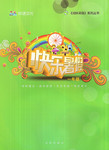题目内容
(B)
How many people have I met who have told me about the book they have been planning to write but have never yet found the time? Far too many .
This is Life , all right , but we do treat it like a rehearsal (排演) and , unhappily ,we do miss so many of its best moments.
We take jobs to stay alive and provide homes for our families always making ourselves believe that this style of life is merely a temporary state of affairs along the road to what we really want to do . Then , at 60 or 65 , we are suddenly presented with a clock and several grandchildren and we look back and realize that all those years waiting for real life to come along were in fact real life.
In America they have a saying much laughed at by the English :“ Have a nice day ”they speak slowly and seriously in their shops , hotels and sandwich bars . I think it is a wonderful phrase , reminding us , in effect , to enjoy the moment : to value this very day .
How often do we say to ourselves , “I’ll take up horse-riding (or golf , or sailing ) as soon as I do get a higher position ,”only to do none of those things when I do get the higher position .
When I first became a reporter I knew a man who gave up a very well paid respectable job at the Daily Telegraph to go and edit a small weekly newspaper . At the time I was astonished by what appeared to me to be his completely abnormal (反常的) mental state . How could anyone turn his back on Fleet Street in central London for a small local area ? I wanted to know .
Now I am a little older and possibly wiser , I see the sense in it . In Fleet Street the man was under continual pressure . He lived in an unattractive London suburb and he spent much of his sitting on Southern Region trains.
60. The first paragraph of the passage tell us that___________________.
A. we always try to find some time to write a book
B. we always make plans but seldom fulfill them
C. we always enjoy many of life’s best moments
D. we always do what we really want to do
61.The underlined phrase “ turn his back on ”( Paragraph 6 ) most probably means______________.
A. leave for B. return to C. give up D. rely on
62. What is probably the best title for the passage ?
A. Provide Homes For Our Family B. Take Up Horse-riding
C. Value This Very Day D. Stay Alive
60-62:BCC
解析

 欣语文化快乐暑假沈阳出版社系列答案
欣语文化快乐暑假沈阳出版社系列答案